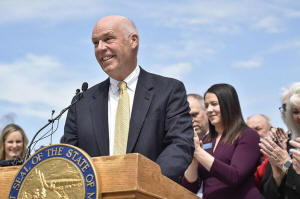Montana Legislature green lights Medicaid expansion as Congress
considers program cuts
[February 28, 2025]
By HANNAH SCHOENBAUM
A Republican proposal to leave current levels of Medicaid coverage in
place in Montana is headed to the governor's desk as Congress considers
billions of dollars in cuts to the low-income health program.
The Montana Senate gave final legislative approval to the bill in a
30-20 vote Thursday. Expanded coverage had been set to expire on the
safety net program that insures more than 76,000 Montana residents.
Republican Gov. Greg Gianforte has voiced support for continuing
coverage, but has not commented on the specific proposal.
A coalition of moderate Republicans and Democrats carried the bill
across the finish line, after effectively wresting control of the Senate
agenda from conservative GOP leaders in recent days. The measure
includes new work requirements for some Montana Medicaid enrollees,
criteria that had been blocked under former President Joe Biden.
In 2015, Montana lawmakers voted to extend Medicaid coverage to adults
between the ages of 18 and 65 with annual incomes slightly higher than
the federal poverty level. Before the Affordable Care Act let states
extend coverage to this group, the program was limited to disabled,
pregnant and elderly people, and children in low-income households. It
now insures nearly 80 million people nationwide.
The state renewed the expanded program in 2019, but set an expiration
date for this summer. Under the latest bill, lawmakers would no longer
need to periodically renew the program.

State Rep. Ed Buttrey, a Great Falls Republican and the bill’s sponsor,
said the program has been a lifeline for low-income residents and the
state’s rural health care providers, which no longer need to spend as
much money caring for uninsured patients.
Medicaid expansion has especially benefitted Montana's Native American
population, improving health outcomes and treatment access, while taking
the strain off the overburdened Indian Health Services.
Most states receive extra federal funding for expanding Medicaid
coverage to more residents. In Montana, the federal government currently
foots about 90% of the $1 billion annual bill.
[to top of second column]
|

Gov. Greg Gianforte speaks at a bill signing ceremony on the steps
of the State Capitol on Wednesday, May 3, 2023, in Helena, Mont.
(Thom Bridge/Independent Record via AP, File)
 Republican opponents such as state
Sen. Carl Glimm of Kila warned Montana could soon be saddled with
much higher costs if Congress cuts funding for the states. The $880
billion Medicaid program is a prime target for the GOP-controlled
body as it looks to slash federal spending.
Montana is one of nine states with trigger laws
automatically or almost automatically ending Medicaid expansion if
the federal government decides to cover less of the cost. Its law
requires the state to identify additional funding if the federal
contribution rate drops.
U.S. House Speaker Mike Johnson has also floated imposing work
requirements, which would limit Medicaid coverage to qualified
people who are actively working, volunteering or otherwise engaging
in their community. Montana and other states have previously
attached work requirements to Medicaid expansion plans, but they
were blocked from taking effect by the Biden administration.
About 92% of Medicaid enrollees are already working, attending
school or caregiving, according to an analysis by the health policy
research firm KFF.
The bill headed for Gianforte's desk renews the state's own push for
work requirements, which President Donald Trump's administration may
be more likely to approve.
“It’s a safety net we need to have, but we also have to make sure
the people that get in the safety net doesn’t cause the safety net
to collapse under its weight,” Gianforte said recently.
Republican governors in Arkansas, Iowa and Ohio have also announced
plans to seek approval from the Centers for Medicare and Medicaid
Services to introduce work requirements. South Dakota voters signed
off last year on a plan to add a similar rule, which also requires
federal approval. About 18,000 people lost coverage when Arkansas
enacted work requirements during the first Trump presidency but
those were later blocked by a federal judge.
All contents © copyright 2025 Associated Press. All rights reserved |